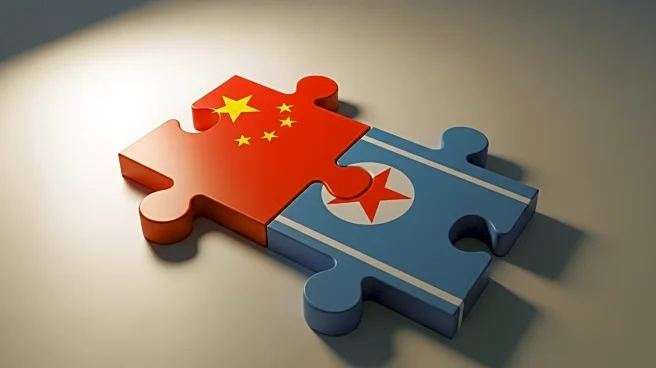What's Happening?
Chinese President Xi Jinping and North Korean leader Kim Jong Un have committed to strengthening their bilateral relations during a meeting in Beijing. The talks occurred alongside celebrations marking the end of World War II, with Kim making a rare international appearance. Xi emphasized the enduring friendship between China and North Korea, promising to bolster ties regardless of global changes. North Korea, facing economic challenges due to U.S. sanctions over its nuclear program, seeks to deepen economic and trade cooperation with China. Kim's visit, his first to China in six years, included his daughter, fueling speculation about her future leadership role. The meeting also involved discussions on North Korea's recent closer ties with Russia, which have raised concerns in Beijing.
Why It's Important?
The meeting between Xi and Kim highlights the shifting dynamics in international relations, particularly in the context of U.S. sanctions and North Korea's nuclear ambitions. Strengthened ties between China and North Korea could impact U.S. foreign policy, especially as North Korea seeks leverage in potential negotiations with President Trump. China's role as North Korea's primary trading partner and aid provider is crucial for Pyongyang's economic stability. The collaboration may also influence regional security, given North Korea's military support to Russia in the Ukraine conflict. The presence of Kim's daughter suggests potential succession planning, which could affect North Korea's future political landscape.
What's Next?
The enhanced cooperation between China and North Korea may lead to increased economic exchanges and trade agreements. Observers anticipate potential diplomatic engagements between North Korea and the U.S., as Kim seeks to negotiate sanctions relief. China's interest in North Korea's return to nuclear talks could shape future diplomatic strategies. The evolving relationship between North Korea, China, and Russia may prompt responses from the U.S. and its allies, potentially affecting regional security and international alliances.
Beyond the Headlines
The meeting underscores the complex geopolitical landscape involving China, North Korea, and Russia, each facing separate confrontations with the U.S. While no formal alliance has been established, their interactions could signal a strategic alignment against U.S. pressure. The implications for global diplomacy are significant, as these nations navigate their relationships amidst international scrutiny. The potential for North Korea to shift its focus from Russia to China could alter regional power dynamics, impacting U.S. interests in Asia.










